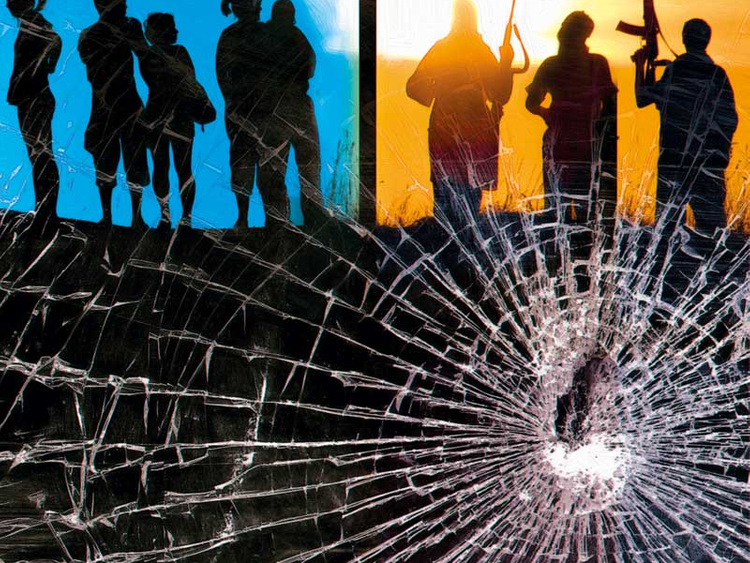Hugo A. Sanchez/©Gulf News
We never cease to turn away in nauseated disbelief at the wanton violence unleashed by Daesh (the self-proclaimed Islamic State of Iraq and the Levant) nor fail to see when that violence bears the group’s stamp.
Meanwhile, Muslims in Europe and the United States have grown tired of defending themselves and their faith, tired of ignoring hostile glances in the streets and racist taunts that define them in popular culture. They watched in horror as a man in London last Monday rammed his rental van into a congregation of Muslims leaving Ramadan prayers, killing one person and injuring 12 others. They had watched in equal horror when a far-right forum on social media responded to the tragic fire that killed 79 people at Grenfell Tower in London, a public housing project in London occupied by predominantly low-income Muslim tenants, with the comment, “Good riddance”.
And yet more horror across the Atlantic, on the same day, when a man in a car abducted 17-year-old Nabra Hassanein outside a mosque in Sterling, Virginia, pummeled her to death with a baseball bat and then dumped her body in a nearby pond.
Should we dust off and begin to re-read that disturbing 1996 book by Samuel P. Huntington, The Clash of Civilizations and the Remaking of World Order, in which the American political scientist predicted that people’s cultural and religious identities will be the source of conflict in our world, following the end of the Cold War, with emphasis on the conflict between the West and Islam?
Not so fast. I say put that book back on the shelf, for the argument it advances is ill-considered and the author’s claim to relevance is modest at best.
It is true that civilisations clash, and have clashed ever since human time became time, as Arnold Toynbee, in his monumental, 12-volume A Study of History (published between 1934 and 1961), and our own historiographer Ibn Khaldun, in his equally monumental Muqaddimah (published around 1387), averred. But in reality, these civilisations clash not because they are differentiated from each other by history, culture, language, tradition and, above all religion, as Huntington repeatedly asserts in his tome. That is not, as lawyers put it, “probable cause”.
Human communities clash, common sense tell us, because they are propelled by contradictions in their objective reality, at any one time or place of immediacy in their social evolution. Indeed, they clash even when they come from the same civilisation. For consider how no century in human history has been as deadly as that of the 20th, when an estimated 10 million people died in the First World War and roughly 70 million in the Second — and that was mostly Europeans slaughtering Europeans, who shared the same putative culture.
Look, Islam and the West — or Islam and Christendom, as the two civilisations were known before the birth of the nation-state — have warred against each other on an epic scale in the Medieval Age and in later years, with Crusaders besieging Jerusalem in 1099, and Ottomans besieging Vienna in 1529. Yes, the impact of these haunting events still resounds, if subconsciously, in the historical archetype of Muslims and Europeans. And the archetype, as Karl Jung would attest, works in mysterious ways.
We can deal with that either by responding to a summons to humane dialogue anchored in reason, or by resorting to racist folly — in short, we either embrace the ‘Alliance of Civilisations Initiative’, proposed by the 59th United Nations General Assembly in 2005, whose goal was to spur collective action across diverse societies, overcoming cultural barriers between the western and the predominantly Muslim world, or we embrace the Islamophobic, morally bankrupt view, say, of someone like Dutch politician Geert Wilders, who claims that there is an irreconcilable clash between “Western civilisation and barbarism”, with the latter being a reference to Islam.
The insidious role that Daesh has played, since its inception as a delusional cult, led by caliphniks who had not read half a dozen decent books between their lives, was to relegate to oblivion — in our time, but not in the history books — the fact for more than five consecutive centuries in the Iberian Peninsula millions of Muslims, Christians and Jews lived, prospered and evolved peacefully together. Toynbee and Ibn Khaldoun, you see, were right, and Huntington was wrong — civilisations with different cultures, traditions and religions have more often lent and borrowed from, rather than clashed with each other.
The caliphniks of Daesh have sullied Islam, poisoned the wells between West and East and subverted our religion in their pursuit of a delusional utopia.
But wait. Let’s quote the rebuke directed at the self-righteous by Jesus Christ: “He that is without sin, let him throw the first stone,” for in the West as well, equally demented men and women were prepared to serve, lets say, Stalinism and Naziism, la mission civilisatrice and the colonial enterprise — in the process inflicting dread on the world in gulags and concentration camps, in the Trail of Tears in the US and in King Leopold’s Ghost — because they had convinced themselves that even the most venomous ideology could be construed as a necessary stage in the transition to their own twisted utopia.
Meanwhile, Muslims in the West are tired, I say, of having to defend their faith at every turn, tired of the hostile glances, tired of looking at themselves and seeing that the mirror is cracked and the image is blurred. Enough!
Fawaz Turki is a journalist, lecturer and author based in Washington. He is the author of The Disinherited: Journal of a Palestinian Exile.










